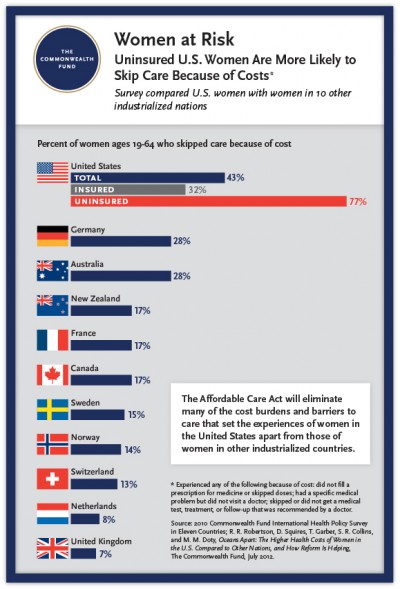Commonwealth Report: Cost Preventing U.S. Women From Getting Needed Healthcare
By Annie Case
A recent report by the Commonwealth Fund found that 20% of U.S. Women were uninsured in 2010, up from 15% in 2000. The report, titled “Oceans Apart: The Higher Health Costs of Women in the U.S. Compared to Other Nations, and How Reform Is Helping,” looked at how these women fared compared to women in 10 countries with universal health insurance coverage. In each category examined, uninsured women in the U.S. fared worse than women in all ten other countries. Even more distressing is the finding that insured women in the U.S. were also more likely to face problems with medical bills and getting needed healthcare than women in other countries. In 2010, there were almost as many U.S. women considered underinsured as there were uninsured (17 million and 19 million, respectively), suggesting that insurance status itself may not be the best predictor of access to health services or satisfaction with those services.
Other notable findings from the report include:
- 39% of women in the U.S. spent $1,000 or more in out-of-pocket medical costs during 2009-2010, compared with 24% of women in Switzerland, 1% in Sweden, and 0% in the United Kingdom
- Women in the U.S. said they have problems paying medical bills at double the rate of women in any of the other countries. One-fourth 26% of women in the U.S. had medical bill problems, compared to 13% in Australia, 12% in France, and 4 % in Germany
- 43% of U.S. women went without recommended care, didn’t see a doctor when they were sick, or didn’t fill prescriptions because of cost
- Only 52% of American women were confident that they could afford health care if they became seriously ill, compared with 91% of women in the United Kingdom, 77% in the Netherlands and 76% in Switzerland
- Among the uninsured, 77% went without needed health care due to costs, more than double the rates of women in other countries
Despite these unsettling statistics, the authors believe that the implementation of the Affordable Care Act will result in significant improvements across the board. The report projects that it will reduce the uninsured rate among U.S. women from 20% to 8% once fully implemented in 2014. Moreover, the authors point out that some of the promise of the ACA is already actionable, as women can now get preventative care with no co-pay or deductible for services such as screenings for cervical, breast and colon cancer, cholesterol checks, and osteoporosis and chlamydia screenings. These changes, in combination with the projected decrease in percentage of uninsured women, will hopefully give women renewed confidence in their ability to manage their health and get the care that they need.

